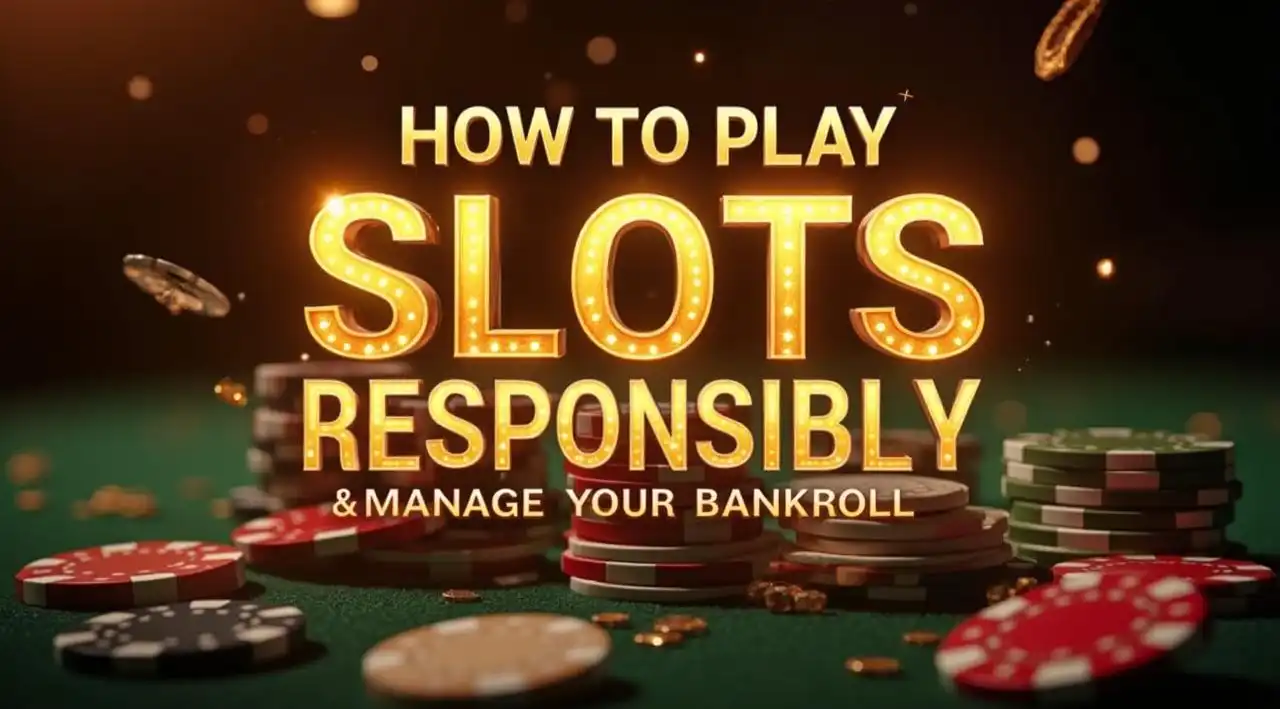How to Play Slots Responsibly & Manage Your Bankroll

Slots are a blast, the flashing lights, the thrilling sound of a big win, and the endless variety of themes make them one of the most exciting games in any casino. But as fun as they are, staying in control is the real jackpot. Slot games are designed to be engaging, fast-paced, and unpredictable, which means it’s easy to get caught up in the excitement and lose track of how much time and money you’re spending.
That’s why responsible slot play matters. The goal is to enjoy the game while keeping your finances intact and your stress levels low. Gambling should always be about entertainment, not about chasing losses or hoping for a life-changing win. When you play smart, you play longer, and with a lot less regret.
In this guide, we’ll walk you through everything you need to know about staying in control while playing slots. You’ll learn why responsible gaming is important, how to manage your bankroll, and practical tips to ensure that slot play stays fun and stress-free. Plus, we’ll cover warning signs that signal when it might be time to take a break.
If you love slots but want to make sure you’re playing them the right way, keep reading, we’ve got your back.
Why Responsible Slot Play Matters
There’s a reason slots are one of the most popular casino games in the world. They’re simple, exciting, and don’t require any special skills to play. Unlike poker or blackjack, where strategy plays a big role, slot machines are all about spinning the reels and seeing what happens.
What makes slots even more enticing is their fast-paced nature. In just a few seconds, you can place a bet, spin the reels, and see whether you’ve won. Compared to table games, where each round might take a while, slots offer instant gratification, which can make them highly addictive if you’re not careful.
Many modern slot games also include immersive themes, bonus rounds, and special effects that make them feel more like video games than traditional gambling. While this adds to the fun, it also means it’s easy to lose track of time and money when you’re caught up in the excitement.
The Risks: The Role of Luck and Potential for Losses
It’s important to remember that slot machines are 100% luck-based. Every spin is determined by a Random Number Generator (RNG), which ensures that the results are completely random and unpredictable. This means:
- There’s no skill involved – unlike poker or sports betting, where strategy matters, slots are purely about chance.
- You can’t “figure out” a machine – patterns don’t exist, and previous spins don’t affect future outcomes.
- Winning streaks and losing streaks are random – just because a machine hasn’t paid out in a while doesn’t mean it’s “due” for a win.
Because of this randomness, losses are inevitable. Slot games are designed so that, in the long run, the casino always has the edge. The RTP (Return to Player) percentage tells you how much a slot is expected to pay back over time, but this number is based on millions of spins, not short-term play. If a slot has an RTP of 96%, it means that, on average, it will return $96 for every $100 wagered, but that doesn’t mean you’ll personally see those returns.
The danger comes when players don’t recognize the luck factor and start chasing losses, thinking they can “win it back” if they just keep spinning. This is how small losses turn into big ones.
The Benefits of Responsible Play: More Fun, Less Stress
When you approach slot games with the right mindset, you can actually enjoy them more. Responsible play isn’t about fear or restriction, it’s about making sure that you’re gambling in a way that’s sustainable, enjoyable, and free of regret.
Here’s what happens when you play responsibly:
- You stay in control of your money. You never risk more than you can afford, so even when you lose, it doesn’t hurt.
- You play for fun, not for financial gain. When you accept that slots are entertainment, not an investment, you won’t feel pressure to “win back” your losses.
- You avoid stress and frustration. Responsible players set limits, take breaks, and know when to walk away, so slot sessions never turn into emotional rollercoasters.
- Your play lasts longer. When you pace yourself, your bankroll stretches further, and you get more entertainment for your money.
The key takeaway? Playing responsibly doesn’t make slots less fun, it actually makes them better. You get all the excitement without the negative consequences.
Setting Up for Responsible Play
Before you start spinning those reels, take a step back and set yourself up for a fun, stress-free experience. Slots should be about entertainment, not financial stress, and the best way to keep it that way is to set clear goals, manage your money, and stick to time limits.
Define Your Goals: Play for Fun, Not for Profit
If you go into a slot session expecting to walk away rich, you’re setting yourself up for disappointment. Slots are random, and no amount of strategy will change that. Instead, decide what you actually want from your session.
- Are you playing to unwind after work? Set a time limit and enjoy the ride.
- Are you hoping to stretch your budget for as long as possible? Choose low-volatility slots and smaller bets.
- Are you looking for a little thrill? Fine, but play knowing that winning isn’t guaranteed.
The key is to see gambling as a form of entertainment, just like going to the movies or a concert. It’s fun while it lasts, but you shouldn’t expect to leave with more money than you started with.
Set a Budget: Only Spend What You Can Afford to Lose
This is rule number one for responsible gambling: decide how much money you’re comfortable losing before you play, and stick to it.
A good way to think about it is to treat your gambling budget like entertainment spending. For example, if you’re comfortable spending $50 on a night out, then that’s what you should set aside for slots. Once it’s gone, the session is over—no exceptions.
- Never use money meant for rent, bills, or essentials.
- Avoid dipping into your winnings to keep playing.
- Don’t justify extra spending by saying, “Just one more spin…”
Many online casinos offer built-in tools like deposit limits and loss limits, which allow you to cap how much you can spend per day, week, or month. If you know you have trouble sticking to a budget, these features can help.
Time Limits: Know When to Stop
Ever sat down to play “just for 20 minutes” and then realized two hours had passed? That’s how slot games are designed, they’re immersive, fast-paced, and easy to lose track of.
The best way to stay in control is to set a timer before you start playing. Decide how long you want to play, 30 minutes, an hour, maybe two tops, and stick to it.
Many online casinos have session reminders that pop up and tell you how long you’ve been playing. If you find yourself ignoring these reminders, that’s a sign you might need to take a step back.
How to Manage Your Bankroll
Bankroll management is the key to making your slot sessions last longer while ensuring you don’t spend more than you can afford. Without a solid plan, it’s easy to blow through your money too fast, or worse, chase losses in a desperate attempt to win it back.
What Is a Bankroll?
Your bankroll is simply the total amount of money you’ve set aside for gambling. Think of it like a vacation budget, if you have $500 for a weekend trip, you’re going to spread it out rather than spending it all on the first night. Gambling works the same way.
Key Strategies for Managing Your Bankroll
Divide Your Funds into Smaller Sessions
Instead of using your entire bankroll in one go, break it up into daily or session-based limits.
Example: If you have $100 for the week, you could:
Play $20 per day for five days.
Play $50 per session, limiting yourself to two sessions.
Decide to stop playing if you double your money.
This way, you’re not burning through your entire budget in one night.
Bet Smart: Choose the Right Coin Sizes & Payline
Your bet size should match your budget. Betting $5 per spin on a $50 bankroll is risky, you could be done in 10 spins. Instead:
If you’re playing with $50, stick to $0.50 or $1 spins.
Choose games with adjustable paylines, so you can lower your bet if needed.
Look for low-volatility slots—these pay out more often, even if the wins are smaller.
Avoid Chasing Losses- Accept That Some Days Aren’t Lucky
One of the worst mistakes gamblers make is trying to win back losses. You might think, “If I just keep playing, I’ll hit a big win.” But the reality is:
- The game doesn’t “owe” you a win.
- You might lose even more chasing that lost money.
- Walking away saves your bankroll for another day.
Set a stop-loss limit (e.g., if you lose half your session budget, walk away). It’s better to come back another time with a fresh mindset.
Cash Out Wins Instead of Reinvesting Everything
A great rule of thumb is to pocket half of any big win. If you win $100 on a $10 bet, withdraw $50 and keep playing with the rest. This ensures that you actually leave with winnings instead of giving it all back.
Understand RTP: How It Affects Long-Term Play
RTP (Return to Player) is a percentage that tells you how much a slot will return to players over time. A slot with 96% RTP means that, on average, it pays back $96 for every $100 wagered.
But this doesn’t mean you’ll personally get $96 back. RTP works over millions of spins, not individual sessions.
The takeaway? Choose games with higher RTP (95% or above) because, in the long run, they give you better odds than lower RTP slots.
Tips for Staying in Control
Playing slots should always be a fun, enjoyable experience, but without the right boundaries, it’s easy to get caught up and lose track of time and money. Staying in control isn’t about taking the fun out of gambling, it’s about making sure you can keep playing responsibly without regrets. Here are five essential tips to help you stay in control while spinning the reels.
Play Sober: Keep a Clear Mind
It’s no secret that casinos offer free drinks for a reason, alcohol lowers inhibitions and makes players take bigger risks. When gambling, it’s best to stay sober so you can make rational decisions. Even outside of alcohol, avoid playing when tired, stressed, or distracted, you want to be in the right mindset to make smart choices.
Take Breaks: Step Away and Reassess
When you’re immersed in a slot game, time flies, and so can your bankroll. Set a timer or take a break every 30–45 minutes. Stepping away helps you reassess your spending and emotions. If you feel frustrated or impatient, it’s time to stop for the day.
Use Free Play to Learn the Game
Before risking money, try free demo versions of slot games. Many online casinos offer free play options where you can learn how a slot works, test bonus features, and get comfortable with the game mechanics. If you’re new to slots or trying a high-volatility game, start in demo mode before switching to real money.
Know the Odds: Slots Are Luck-Based
No matter how fun they are, slots are 100% luck, there’s no strategy that can guarantee wins. Every spin is random, and past results don’t influence future ones. Understanding this helps you set realistic expectations and avoid falling into the trap of thinking a machine is “due” for a win.
Set Win/Loss Limits: Know When to Walk Away
A good rule of thumb is to stop playing if you double your budget or lose your set amount. For example:
- If you start with $50 and win $100, cash out at least half so you don’t give it all back.
- If you lose your budgeted amount, don’t deposit more—call it a day.
By following these tips, you stay in control, enjoy slots responsibly, and avoid turning fun into frustration.
Recognizing and Avoiding Problem Gambling
Gambling is supposed to be a source of entertainment, but for some players, it can become a problem. The line between casual play and problem gambling isn’t always obvious, but there are warning signs that indicate when gambling is starting to negatively impact your life.
Warning Signs of Problem Gambling
If you notice any of these behaviors in yourself or someone else, it might be time to take a step back:
- Spending more money than planned. You deposit $50 but end up spending $200 in an attempt to win it back.
- Feeling anxious, guilty, or irritable after playing. Instead of feeling entertained, you feel stressed or regretful.
- Borrowing money to gamble. Using credit cards, loans, or asking friends for money to keep playing.
- Prioritizing gambling over responsibilities. Missing work, neglecting bills, or skipping social activities to gamble.
- Chasing losses. Losing money and immediately trying to win it back with bigger bets.
If any of these sound familiar, it’s time to pause and reassess your habits. The earlier you recognize the problem, the easier it is to regain control.
What to Do If Gambling Feels Like a Problem
1. Take a Step Back and Reflect
Ask yourself:
- Am I gambling for fun, or am I gambling because I feel like I “have” to?
- Do I feel in control of my gambling, or does it feel like it’s controlling me?
- Am I spending money that I can’t afford to lose?
If your answers suggest gambling is causing stress rather than enjoyment, it’s time to make changes.
2. Use Responsible Gaming Tools
Most reputable online casinos offer tools to help players manage their gambling habits. These include:
- Deposit Limits – Set a cap on how much you can deposit per day, week, or month.
- Time Limits – Get reminders about how long you’ve been playing.
- Self-Exclusion – Block access to your account for a set period.
If you feel gambling is becoming a problem, use these tools to help you set boundaries and regain control. Many licensed casinos offer these features.
3. Seek Help – You’re Not Alone
Problem gambling isn’t about weakness or lack of willpower—it’s a real issue that affects millions of people. The good news? There are resources to help.
- GamCare (UK)– Offers confidential support via helpline and chat.
- National Council on Problem Gambling (US) – 24/7 help for gambling addiction.
- BeGambleAware– Information and self-help tools for responsible gambling.
Reaching out for support isn’t a sign of failure, it’s a positive step toward regaining control. Even if you’re unsure whether gambling is becoming a problem, talking to a professional can provide clarity and guidance.
Taking Charge of Your Gambling Habits
If you recognize any of the warning signs, making changes now can prevent bigger problems later. Responsible gambling isn’t about quitting altogether, it’s about ensuring that gambling stays fun, safe, and under control.
At the end of the day, gambling should never feel like an obligation. If it stops being enjoyable, it’s time to step away, reset, and come back only when you’re sure you’re playing for the right reasons.
Tools that Will Help
Staying in control while playing slots isn’t just about willpower—there are plenty of tools and resources available to help you manage your play, track your spending, and get support if needed. Here’s what you can use to make sure your slot gaming stays fun and responsible.
Casino Features for Safer Play
Many licensed online casinos offer built-in features designed to promote responsible gambling. These tools help players set boundaries and stay in control:
- Deposit Limits: Set daily, weekly, or monthly limits on how much you can deposit.
- Reality Checks: Timed reminders that alert you about how long you’ve been playing.
- Cooling-Off Periods: Temporarily block yourself from playing for a set time.
- Self-Exclusion: If you need a longer break, this tool restricts access for weeks, months, or permanently.
Apps & Trackers to Monitor Your Spending
If you want to keep a closer eye on your bankroll, budgeting apps can help:
- Gamban – Blocks gambling sites and apps across devices.
- BetBlocker – Lets you self-exclude from online casinos.
- Spendee or PocketGuard – General budgeting apps to track spending.
Using these tools can prevent overspending and help you keep track of how much you’re actually betting.
Support Options for Problem Gambling
If you ever feel like gambling is becoming a problem, support is available:
- GamCare (UK)– Free, confidential support.
- National Council on Problem Gambling (US)– Helpline and resources for responsible gambling.
- BeGambleAware– Education and self-help tools.
Play Low-Stake Slots for Budget-Friendly Fun
One way to keep slot gaming affordable is to stick to low-stake games. Many casinos offer penny slots and low-volatility games that let you play longer without risking large amounts.
Final Words
Responsible slot play isn’t about taking the fun out of gambling—it’s about making sure you can enjoy the thrill without stress or regret. Setting spending and time limits, managing your bankroll, and knowing when to walk away all contribute to a better, more enjoyable gaming experience.
If you love playing slots, but want to do it the right way, try using the tools and strategies we’ve outlined. Whether it’s setting a budget, taking breaks, or using responsible gaming features, a little planning goes a long way.
Spin smart, stay in control, and keep the fun rolling!





